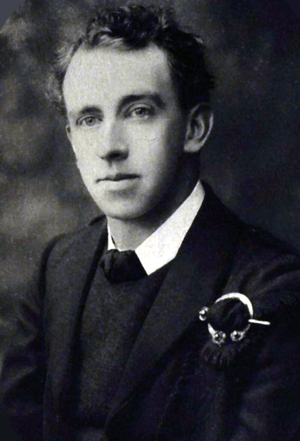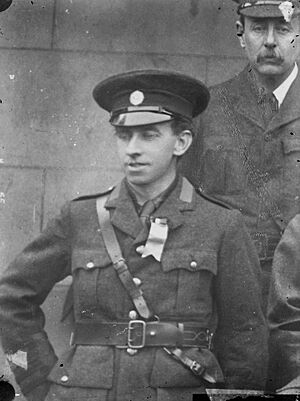Thomas MacDonagh facts for kids
Quick facts for kids
Thomas MacDonagh
|
|
|---|---|
 |
|
| Born | 1 February 1878 Cloughjordan, County Tipperary, Ireland |
| Died | 3 May 1916 (aged 38) Kilmainham Gaol, Dublin, Ireland |
| Allegiance | Irish Volunteers |
| Years of service | 1913–1916 |
| Rank | Commandant |
| Commands held | 2nd Battalion |
| Battles/wars | Easter Rising |
| Spouse(s) | Muriel Gifford |
| Children |
|
Thomas Stanislaus MacDonagh (born February 1, 1878 – died May 3, 1916) was an Irish poet, writer, teacher, and revolutionary leader. He was one of the seven main leaders of the Easter Rising in 1916. This was a major event where Irish people fought for independence from British rule. Thomas MacDonagh also signed the Proclamation of the Irish Republic. He was a leader (Commandant) of the 2nd Battalion of the Irish Volunteers in Dublin. His group fought in Jacob's biscuit factory during the Rising. He was put to death for his part in the Rising when he was 38 years old.
MacDonagh was an assistant headmaster at St. Enda's School, which was a special school that taught in both Irish and English. He also taught English at University College Dublin. He was part of the Gaelic League, a group that promoted the Irish language and culture. There, he became good friends with Patrick Pearse and Eoin MacNeill. He helped start the Irish Volunteers with them. Thomas MacDonagh also wrote poems and plays. His play, When the Dawn is Come, was shown at the Abbey Theatre in 1908.
Contents
Early Life and Education
Thomas MacDonagh was born in Cloughjordan, County Tipperary, Ireland. His parents, Joseph and Mary, were both teachers. He grew up in a home full of music, poetry, and learning. From a young age, he loved both English and Irish culture. His brothers included Joseph MacDonagh, who later became a politician, and John MacDonagh, a film director.
Because his parents were teachers, education was very important in their family. MacDonagh went to Rockwell College. For a few years, he thought about becoming a missionary. However, he decided it wasn't for him and left. Soon after, in 1902, he published his first book of poems called Through the Ivory Gate.
He taught at St Kieran's College in Kilkenny. From 1903, he taught French, English, and Latin at St. Colman's College in Fermoy, County Cork. While in Fermoy, he also started a branch of the Gaelic League. He was one of the people who helped create the ASTI. This is a trade union for secondary school teachers, which started in Fermoy in 1908. Later, he moved to Dublin and became close friends with Eoin MacNeill and Patrick Pearse.
A Teacher and Friend
Because of his friendship with Patrick Pearse and his love for the Irish language, MacDonagh joined the staff at Pearse's St. Enda's School when it opened in 1908. He taught French and English and was the Assistant Headmaster. He was also one of the people who helped start the ASTI teachers' union.
When he got married, he became a lecturer in English at the National University of Ireland. But he still supported St. Enda's School. MacDonagh truly loved the Irish language. In 1910, he became a tutor for a younger member of the Gaelic League, Joseph Plunkett. Both MacDonagh and Plunkett were poets who loved Irish Theatre. They became lifelong friends.
On January 3, 1912, Thomas MacDonagh married Muriel Gifford. Their son, Donagh, was born in November that year. Their daughter, Barbara, was born in March 1915. Muriel's sister, Grace Gifford, married Joseph Plunkett just hours before he was put to death in 1916.
MacDonagh supported workers during the Dublin lockout. This was a big strike in Dublin where workers fought for better conditions. He was part of a group that tried to find a fair solution to the dispute.
Joining the Fight for Ireland
In 1913, both MacDonagh and Plunkett went to the first meeting of the Irish Volunteers. They joined its main committee. MacDonagh was later made a leader (Commandant) of Dublin's 2nd battalion. He eventually became the leader of the entire Dublin Brigade.
At first, MacDonagh believed in peaceful political change. But by spending time with people like Pearse, Plunkett, and Seán Mac Diarmada, and seeing how Europe was preparing for World War I, he started to believe more strongly in Irish independence. He joined the Irish Republican Brotherhood (IRB) in 1915. Around this time, Tom Clarke asked him to help plan the large funeral for Jeremiah O'Donovan Rossa. This funeral was a huge success for promoting Irish independence. This was mostly thanks to the powerful speech given by Pearse at the graveside.
The Easter Rising
Thomas MacDonagh is known as one of the seven leaders of the Easter Rising. However, he joined this secret group that planned the Rising only weeks before it happened in April 1916. It's not fully clear why he joined so late. He was still quite new to the IRB. But his close friendships with Pearse and Plunkett might have been a reason. Also, he was a leader of the Dublin Brigade. MacDonagh was one of the people who signed the Proclamation of the Irish Republic.
During the Rising, MacDonagh's group was based at the large Jacob's Biscuit Factory. On their way there, they met an old Irish fighter named John MacBride. He joined them on the spot as a second-in-command. He actually helped lead the group during Easter Week, even though he didn't know about the Rising beforehand. MacDonagh's original second-in-command was Michael O'Hanrahan.
Even though MacDonagh was a high-ranking leader and commanded a strong group, they didn't see much fighting. The British Army avoided the factory as they set up positions in central Dublin. MacDonagh received the order to surrender on April 30. His whole group was ready to keep fighting. After the surrender, MacDonagh was tried by a military court. He was put to death by a firing squad on May 3, 1916, when he was 38 years old. He was the third person who signed the Proclamation to be put to death. It is said that he whistled as he was taken from his cell to be executed.
His wife, Muriel, passed away in July 1917. Their son, Donagh MacDonagh, became a judge and was also a famous poet and writer. He was an important part of the Irish literary scene in the 1940s-1960s. Their daughter, Barbara, married the actor Liam Redmond. She wrote many scripts for Irish radio in the 1950s and 1960s.
Legacy and Remembrance
Thomas MacDonagh was known for being one of the most friendly and easygoing leaders of the Rising. Geraldine Plunkett Dillon, Joseph Plunkett's sister, described him as someone who made everyone feel like a friend. She said he had a pleasant, smart face and was always smiling.
He was an important person in Dublin's literary world. The famous poet W.B. Yeats wrote poems about him. His friend Francis Ledwidge also wrote a poem called Lament for Thomas MacDonagh.
Thomas MacDonagh Tower in Ballymun, Dublin, was named after him. It was built in the 1960s and taken down in 2005. The MacDonagh Railway Station in Kilkenny and the MacDonagh Junction shopping centre are also named in his memory. This is because he taught at St Kieran's College in Kilkenny early in his career.
The Thomas MacDonagh Heritage Centre in Cloughjordan, County Tipperary, opened in 2013. It has the town library and a space for exhibitions. Every year, a Thomas MacDonagh Summer School takes place in Cloughjordan.
Several Gaelic Athletic Association (GAA) clubs and sports grounds in County Tipperary are named after MacDonagh. These include Kilruane, Nenagh, and a North Tipperary group called amalgamation.
The McDonagh Barracks buildings are a large part of the Curragh Camp in Kildare. A nearby pitch & putt course also carries his name.
Since MacDonagh was a founding member, the Association of Secondary Teachers Ireland (ASTI) gives out the 'Thomas MacDonagh Medal'. This award is for members who have given "extraordinary service to the union."
Works
Some of his works include:
- Through the Ivory Gate
- April and May
- When the Dawn is Come
- Songs of Myself
- Lyrical Poems
- “The Golden Joy”
- “The Stars Stand Up in the Air”
- Thomas Campion and the Art of English Poetry
- Literature in Ireland (published after his death)
See also
 In Spanish: Thomas MacDonagh para niños
In Spanish: Thomas MacDonagh para niños
 | William L. Dawson |
 | W. E. B. Du Bois |
 | Harry Belafonte |


